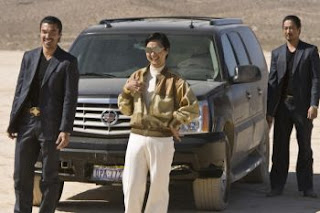
223) Fortress (1993) Dir: Stuart Gordon Date Released: September 1993 Date Seen: July 25th, 2009 Rating: 3.75/5
Based on a story by Troy Neighbors and Steven Feinberg, Stuart Gordon's Fortress captures the twisted humanity and frothing-mad paranoia of Philip K. Dick's fiction better than almost every film adaptation. This however is not the relatively lucid Dick most people know, whose stories draw a neat line between oppressor and downtrodden grunt hero but rather the one that wrote "The Pre-Persons," an alarming pro-life short story that doesn't stem from any strictly "conservative" or "liberal" viewpoint but rather a Chicken Little, "The Sky is Falling On All Mankind" mentality. Abortion in the story is used by women to entrap men. It's such a sinister plot that no man has thought to rebel against it and hence has already become eerily naturalized.
Fortress likewise is about the fight to save a future generation waged almost entirely in a mammoth prison modeled after California's "Supermax" facilities. The "Fortress" prison is the ultimate testing ground for humanity, where prospective parents John and Karen Brennick (Christopher Lambert and Loryn Locklin) have to prove their devotion to each other and to their unborn child. In the film's near-future, couples are only allowed to conceive one kid, making the Brennicks unjustly oppressed fugitives because of their desire to replace their firstborn, which miscarried. The two are caught and immediately sent to the "Fortress," a subterranean facility lorded over by an all-seeing, none-forgiving Artificial Intelligence and Warden Poe (Kurtwood Smith). You know you're up Shit Creek when the bad guy from Robocop is the good cop.
Considering that prison has become the ultimate pop symbol for the repression of the human spirit, the "Fortress" is the perfect place to try John and Karen as a Neu Adam and Eve. They are subjected to over-crowding, bullying from fellow inmates and worst of all, a new torture device called "The Intestinator." The tazer-like device is rammed down their gullets upon admittance and used by Poe and their evil Robo-guard to keep unruly prisoners in line under penalty of fatal and literally explosive pain. Toss in the fact that Poe is obsessed with Karen and eventually forces her to become his live-in servant and you have a perfect storm of inhumane conditions (At least, as perfect as Gordon and the film's four screenwriters were willing to go within the confines of the film's R Rating, which is mostly for language, if I remember correctly).
As the active half of the couple, John's primal struggle to defend his wife and unborn child transforms him into a towering everyman fighting for the most elemental kind of freedom. When he's tortured for being involved in a fight with a bloodthirsty inmate, his mind, not his body, is tested, as if that were the last place his keepers could hurt him. In this first of two Freudian hallucinations, we see John's tragic self-image. His role in fathering Poe and a whole generation of other obedient cyborgs is fittingly represented through photo-negative images of Poe clutching a preserved fetus. Knowing and more importantly experiencing this, he makes like Oedipus and tries to gouge his eyes out, preferring ignorance of his role as Ur-Man to the pain of knowing that he's responsible for saving us all.
Fortress's vision of John as unmatched Ubermensch figure is hence only really challenged by Poe (the Prison's Big Sister security system only enforces the villainous status quo Brennick opposes by ceaselessly babbling, "Crime doesn't pay"). Poe's the only man in Gordon's typically stellar cast of supporting characters, which includes Jeffrey Combs and Lincoln Kilpatrick, whose psychological needs extend beyond making due in the prison. His responsibility as an overseer, even a cruel one, affords him more complexity than the rest, who all die helping John and Karen escape.
Poe is different from the rest because, like John, he is destined to be someone, namely John's adversary. At one point, Karen soothes Poe into complaisance by cooing, "You only think that because you're a man. You keep something inside of you that no one else can touch." Both Poe and John are tortured machos with no recourse but to play the hand that Fate has dealt them. The key difference between the two is that Poe's on the wrong side of morality and hence must be punished by film's end, dying the most gruesome death of anyone in the film (the flesh is literally stripped from his bones by an astounding implosion, exposing for a second his white-hot skull). Karen's projected assessment is hence not the kind that redeems or even excuses his actions but rather makes him a better baddie.
It may be tempting to dismiss Fortress because of its strident, quasi-archetypal message but even the film's production history defies normal B-movie classification. The fact that Gordon insisted on building the labyrinthine "Fortress," creating the largest single set in Australian film history, and that Lambert was so gung-ho to film all his own stunts shows that there was a perceived sense of urgency on the set, one that propels the film so far over the top that it's impossible to refuse it its grandiose doomsaying.

































